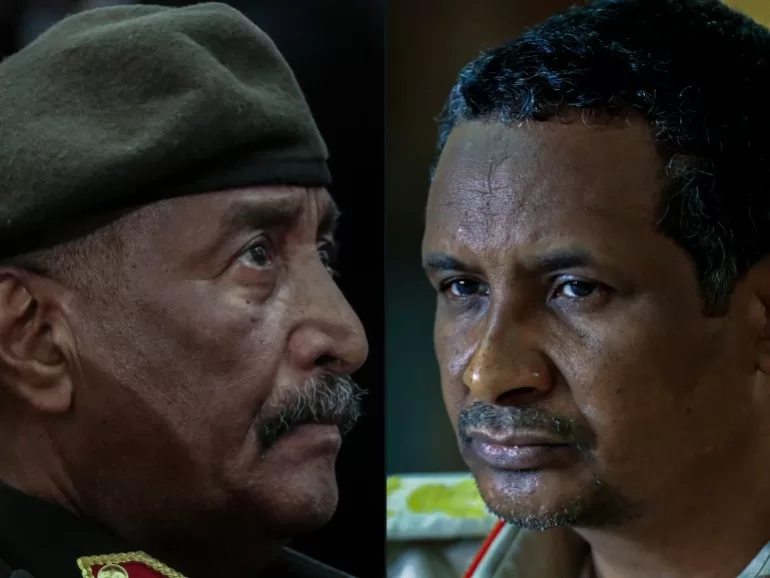General Abdel Fattah al-Burhan tells Al Jazeera many countries remain silent over alleged RSF crimes in Sudan’s civil war.
Sudan has been gripped by war since April 2023, when fighting erupted between forces loyal to al-Burhan and the RSF led by his former deputy, Mohamed Hamdan Dagalo.
Since the war broke out, tens of thousands of people have been killed and millions more have been displaced as a humanitarian crisis has deepened.
Both sides have been accused of possibly committing war crimes by UN officials and rights groups.
![Twenty years after terrorising civilians in Darfur as bedfellows, the army and RSF fought as foes. Shown is army chief Abdel Fattah al-Burhan, left, and RSF commander Mohamed Hamdan 'Hemedti' Daglo, created on April 16, 2023 [Ashraf Shazly/AFP]](https://www.aljazeera.com/wp-content/uploads/2024/04/33DA98B-highres-1-1713167047.jpg?w=770&resize=770%2C578)
In an exclusive interview with Al Jazeera in Port Sudan, al-Burhan said, “Many countries remain silent and turn a blind eye to the crimes being committed every day.”
“Every day, the enemies are killing the Sudanese people, plundering their land and raping their wives and daughters … Everyone who remains silent and those who support what the other side is doing daily is definitely an enemy,” al-Burhan said, without naming any country.
“Perhaps some countries have used their influence to stop aid provided to the Sudanese state. Some countries may have used their international and regional mechanisms to stop supporting the armed forces,” he added.
In March UN High Commissioner for Human Rights, Volker Turk, said his team had documented dozens of cases of sexual violence.
“Sexual violence as a weapon of war, including rape, has been a defining – and despicable – characteristic of this crisis since the beginning,” he said.
His team has documented 60 incidents of conflict-related sexual violence, involving at least 120 victims across the country, the vast majority women and girls, he said but added that “these figures are sadly a vast underrepresentation of the reality.”
“Men in RSF uniform and armed men affiliated with the RSF, were reported to be responsible for 81 percent of the documented incidents,” Turk said.
Paramilitary gains
The RSF has, in recent months, made several breakthroughs and is closing in on Port Sudan on the Red Sea, where the army, government and United Nations agencies are currently based.
When questioned about the RSF’s military gains, al-Burhan stated that “losses in battle or retreating in a certain situation does not mean losing the battle itself, and doesn’t mean defeat”, adding that “the Sudanese people and the Sudanese armed forces will never be defeated”.
In late June, the Integrated Food Security Phase Classification (IPC) said that the war has left some 755,000 Sudanese facing “catastrophe”, the most severe level of extreme hunger, while 8.5 million people grapple with food shortages that could result in acute malnutrition and death.
The United Nations hunger monitoring system recently warned of a realistic chance of famine in several areas of Sudan including parts of Darfur, Khartoum, Kordofan and Gezira states.

When asked about the humanitarian situation, al-Burhan told Al Jazeera, “When we’re talking about famine, we must talk about its causes and about those responsible for it.”
“Sudan has vast areas of arable land, and Sudan has huge numbers of farmers who know how to work these lands; most of the arable land has been cultivated except for the lands where the Janjaweed terrorist groups threatened citizens and prevented them from cultivating,” he said.
The RSF was born out of the Popular Defence Forces militias, commonly known as Janjaweed, mobilised by Sudan’s former President Omar al-Bashir against non-Arab tribes in Darfur.
“In Sudan, we have shortages in some areas that are under the control of these rebels, but in the rest of the country, there are no shortages, except for areas where people have been displaced,” he said.
